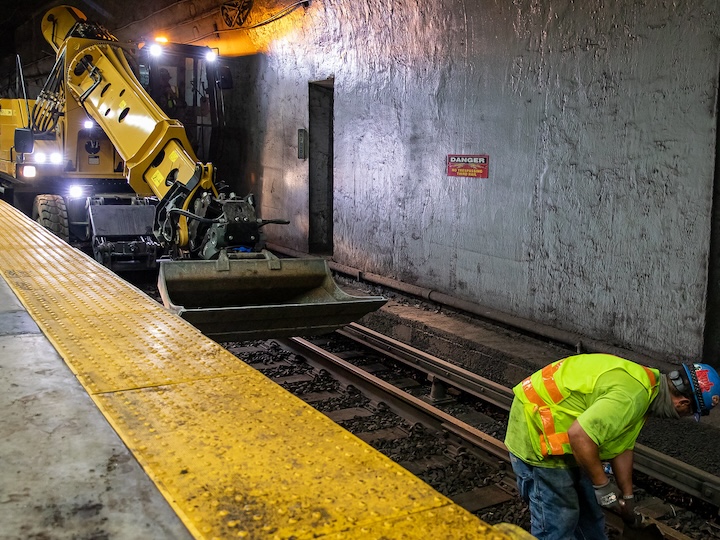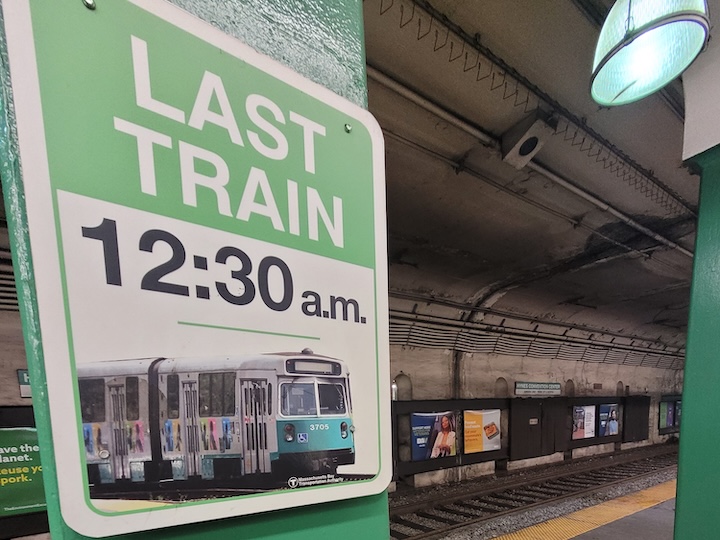“Employees feel that they give feedback in surveys and then nothing changes.” “Communication is not direct and not consistent.”
I know a lot of T workers. Some of them I met through journalism, on the beat. Others I just know from more than 20 years of living and boozing in and around Greater Boston.
I won’t use their real names, but I’ll start with the story queen Gretchen, a train operator who once told me that one of her coworkers got sober for the job—after years of heavy coke and alcohol abuse which may or may not have impeded her ability to safely propel a prehistoric steel bullet through tunnels underground—by sleeping with as many willing partners as she can possibly find, whatever race, age, job, or gender. As legend has it, she’s hot for train yards and T kink in general.
Then there’s Paddy. He’s a supervisor. He’s so terrified of the system he helps run that he moved his family to the suburbs where they’re not tied to the T. He even drives himself to work downtown and back every day, and recently said he’ll continue doing so despite the elimination of slow zones.
One friend’s mother has been working at Park Street and Downtown Crossing for several decades. She will tell you stories about fighting off the rats at night after the last train leaves in order to get upstairs to street level. Apparently the platforms turn into a scene from Willard when the lights dim.
And there is Sal, the former T mechanic. He told me at one of the shops where he worked, they’d lift a bus on the hydraulic jack and get to work in the morning, toiling under the 15,000-pound column. When his crew returned from lunch, the bus would be lower than where they left, more than a foot closer to flattening anything under it. They’d crank it right back up and get to work.
You don’t read a lot of articles about public transit workers. Not unless they are inebriated and twist metal, steal something, or get tragically injured on the job, though that last one doesn’t guarantee headlines. The reason is simple—despite T employees comprising a sizable demographic, with more than 7,000 workers plus their families and anyone else who is directly impacted by their wellbeing, editors and news producers doubt that members of their audiences care about their plight.
I recently had this phenomenon confirmed after the Boston Institute for Nonprofit Journalism secured internal documents related to “the status of the MBTA workforce,” including “strengths and weaknesses,” “calculations of mission-critical resource needs and current resource capabilities,” and a systemwide “safety risk assessment.” The release came after our reporting last year noted how the T had spent millions to gauge whether the agency has enough trained workers to run the system safely, but was unwilling to share that information with the press or public. Following our appeal, and the commonwealth’s supervisor of public records writing that the MBTA “must clarify these matters,” the T reluctantly released a trove, including a final Workforce and Safety Risk Assessment report.
Those documents will inform all the transit journalism we do moving forward, offering critical context regarding the MBTA’s adherence to safety directives dictated by the Federal Transit Administration. What’s less hopeful is the unbelievable disinterest that other journalists have had in these reports. One television reporter told me that his superiors don’t think T employee safety is something commuters care about—as if the conditions of those running the service are separate from the conditions of the service and the impact on riders.
I disagree of course, since I believe that news consumers of all stripes and political leanings would feel similarly nauseous if they were provided with more information. For example, if more straphangers knew how the workers who we trust with our lives every day feel about the MBTA, they might better understand that we are all in this together.
In one systemwide assessment from August 2023 that we received from a public records request, the compendium of pain points included “data collection,” with one employee saying, “Staff maintain entirely separate data reports on the same topic, then wonder why those reports look different.” Another said, “We don’t have anything built to give us the one source of truth.”
In the same report, a T worker told the MBTA’s Quality, Compliance, and Oversight office, “When you are fighting a fire every day, it is hard to think long-term.” A colleague added, “Employees feel that they give feedback in surveys and then nothing changes.” With another one noting, “Communication is not direct and not consistent. … Departments don’t know what is going on in the other departments.”
To be fair, there have been many improvements on multiple fronts since that report, which back in late 2023 noted that “Even prior to recent scrutiny from the FTA, the MBTA has made great strides in examining its capacity—the focus on hiring has led to new avenues and mechanisms for recruitment, resulting in increased number of new hires.” There were even glimmers of hope: “Many employees at the MBTA share a common motivation to succeed [and] pride in the Authority’s mission.”
At the same time, even the staunchest T defender would concede that they’re quite a distance from squaring away all the shortages and problems outlined in the June 2024 Workforce and Safety Risk Assessment report that we pried from the agency. Even with Mass Gov. Maura Healey getting praise for prioritizing hires and MBTA General Manager Phillip Eng tending to the engineering side, it’s important to center the experience and safety of those who we rely on for safety and a positive experience—through transparency, journalism, Facebook, whatever it takes. As one employee told the agency’s quality crew in an interview, “I feel like sometimes I know more about what is happening at the T through social media and the news than through the organization.”







